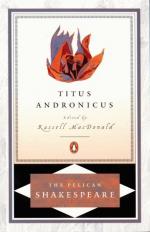|
This section contains 5,602 words (approx. 19 pages at 300 words per page) |

|
SOURCE: Miola, Robert S. “Titus Andronicus and the Mythos of Shakespeare's Rome.” Shakespeare Studies 14 (1981): 85-98.
In the following essay, Miola probes Shakespeare's thematic appropriation of two Ovidian myths—the rape of Philomela and the story of the world's four stages—in Titus Andronicus.
Readers have rarely praised Shakespeare's strenuous imitation of classical authors and themes in Titus Andronicus. For most of us, the play is a vile hash of Ovid, Seneca, Plutarch, and Virgil, made more unpalatable by the self-consciousness of the various imitations and allusions. Critical indigestion has begotten critical indignation; it would be easy to compile a colorful anthology of disparaging pronunciamentos beginning with Ravenscroft who in 1687 likened the structure of Titus Andronicus to “a heap of Rubbish.”1 Such critical repugnance, however, has also occasioned serious discussion on the nature and style of Shakespeare's neoclassicism. An influential article by Eugene M. Waith, for example, argues that...
|
This section contains 5,602 words (approx. 19 pages at 300 words per page) |

|


